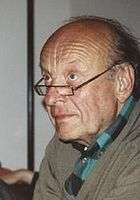László Nagy (Scouting)
László Nagy (September 2, 1921 – December 18, 2009; Hungarian pronunciation: [ˈlaːsloː ˈnɒɟ]) was the Secretary General of the World Organization of the Scout Movement from May 1, 1968, to October 31, 1988. A Swiss citizen of Hungarian origin, he was a sociologist, a historian, a Doctor of Political Science, a former journalist and the author of a number of books on politics.
László Nagy | |
|---|---|
 | |
| Born | September 2, 1921 Budapest, Hungary |
| Died | December 18, 2009 (aged 88) Geneva, Switzerland |
Biography
Nagy was born in Budapest, Hungary, in 1921, discovered Scouting and went on to become an assistant Scoutmaster. He attended the 4th World Scout Jamboree held in Gödöllő, Hungary in 1933.
Nagy received a Masters in sociology and law, and a PhD in political science. He was a graduate of the business administration School at the University of Geneva. He studied for many years under the direction of child psychologist Jean Piaget. Later, he became the Director of Study and Head of the Department of Research and Documentation at the Graduate Institute of International Studies in Geneva.
Nagy was also a journalist and author. He was Foreign Editor of the Gazette de Lausanne. Internationally he was recognised as an authority on the problems of Eastern Europe and of Sub-Saharan Africa. The books he authored included Imre Nagy, Katanga, Lenin and History of People's Democracies.
.png)
In 1965, he undertook a two-year critical study of the world Scouting movement around the world, sponsored by the Ford Foundation and appointed by the Graduate Institute of International Studies. Nagy published the Report on World Scouting in June 1967. In the course of the study, much data was compiled for the first time about worldwide Scouting, with many international trips made and countless interviews held. In the report, Nagy analysed and defined both the problems and strengths of World Scouting.[1]
The 1967 World Scout Conference accepted the Nagy Report with its many recommendations for the improvement of World Scouting and its reorganisation. In 1968, WOSM invited him to put his recommendations into practice and appointed him to his WOSM post, for a three-year term that eventually lasted 20 years.
Nagy was awarded the Bronze Wolf, the only distinction of the World Organization of the Scout Movement, awarded by the World Scout Committee for exceptional services to world Scouting, in 1977. In 1987 he also received the highest distinction of the Scout Association of Japan, the Golden Pheasant Award.[2]
Nagy was married to the former Monique Cuendet, a Genevoise artist, and had two sons, Antoine (born in 1958) and Laurent (born in 1960) and a daughter, Anns Valerie (born in 1962).
Books published
- Dr. László Nagy, 250 Million Scouts, The World Scout Foundation and Dartnell Publishers, 1985
See also
References
- Eduard Vallory (2012), World Scouting: Educating for Global Citizenship, Palgrave MacMillan, ISBN 1137012064, p. 33.
- reinanzaka-sc.o.oo7.jp/kiroku/documents/20140523-3-kiji-list.pdf
External links
| World Organization of the Scout Movement | ||
|---|---|---|
| Preceded by Richard T. Lund |
Secretary General 1968–1985 |
Succeeded by Jacques Moreillon |